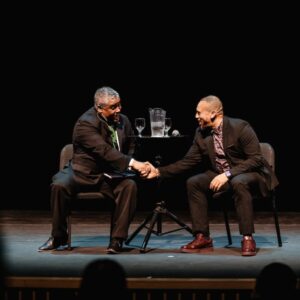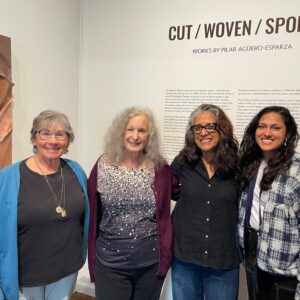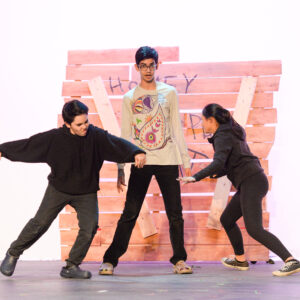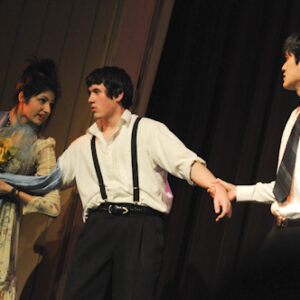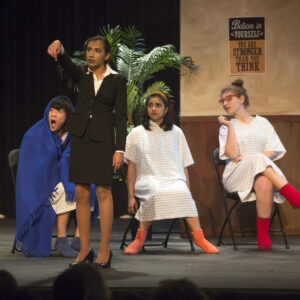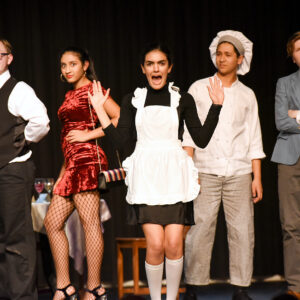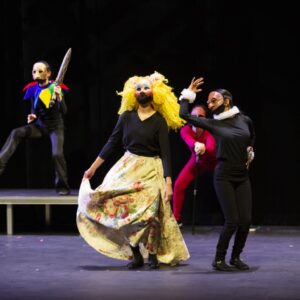Student Directed Showcase, the venue for final projects by students in the class of the same name, took place in early January to sell-out crowds. The theme this year was comedy and three vignettes, “Scuba Lessons,” directed by Priya Bhikha, “Check, Please,” directed by Nikita Agrawal and “Christmas Incorporated,” directed by Maggie Woods, all seniors, were performed in front of an enthusiastic audience at the Blackford Theater.
The productions were entirely cast and set by their directors, using volunteer students. The student directors underwent an interview process to be chosen for the class, taught by Laura Lang-Ree. Once selected, the students start researching plays the summer before school begins, and in class Lang-Ree guides them through the myriad details of show direction. They learn the intricacies of casting, budgeting, staging, designing and leading a cast and crew.
In “Check, Please,” Agrawal directed a cast of 15 in her hilarious take on playwright Jonathan Rand’s well-known comedy on the vagaries of blind dinner dates. Woods’ production had nine actors and took a hard and hilarious look at one girl’s Christmas wish for Santa to eliminate her most despised teacher. Bhikha chose another blind date comedy, set in a coffeehouse, in which two good friends sabotage each other’s dates, only to end up with each other; her show featured 14 actors, including extras.
Crew, an integral part of any production, was led by “Advisor and Super-Mom” Lang-Ree, as the directors refer to her in their program notes. Set and lighting design was done by Paul Vallerga of the performing arts department, stage manager was Scott Underwood, Gr. 12, with Araby Martin, Gr. 11, as assistant stage manager. Brian Larsen, performing arts technical director, handled sound design. The deck crew consisted of Bridget Nixon, Rachelle Koch, both Gr. 10 and Gabriel Yanovsky, Gr. 11, and follow spot operators were Charles Levine and Nandita Krishna, both Gr. 10.
The three directors answered questions on their efforts following the performances.
OOC: What was the most challenging part of putting on your production?
Agrawal: The most challenging part of putting on the production was being louder than fifteen people! I swear I almost bought a whistle once. Other than that, technical things like learning the lingo of the headset were difficult because it was my first time communicating professionally as a director with the many different people involved.
Woods: Casting was the most difficult part of the process because it was so hard to say “no,” to make steadfast decisions that would partly determine the course of my play, and to work with the other directors to get us each exactly what we needed. We stayed until 9:30pm on call-back night and we had to have a second round of callbacks on Monday in addition to that, so the process was tough and dragged out.
Bhikha: The most challenging part of putting on the production was probably coordinating rehearsal schedules. Everyone had different activities they were involved in at different times, and it was difficult getting everyone to stick to one time, but we did it!
OOC: What was the most fun?
Agrawal: Mass cast rehearsals were always the most entertaining, because when everyone came together, there was always an exciting and tangible energy amongst everyone. It was so much fun being in a room of energetic performers who were ready to take risks and be even bigger with their newfound energy. Everyone was there to tell a story, and when we all came together, the show came to life.
Woods: Rehearsals. The people I cast were so personable and friendly with each other that I never had to break up any arguments or pull anyone aside for a “chat.” We were all pretty much friends, or at least friendly acquaintances, and enjoyed each others’ company, so rehearsals seemed more like parties than work. Second would be the SDS classes – again, my fellow directors are two of my best friends and Ms. Lang-Ree is like our second mom. Having SDS classes with them at the end of the day would always brighten my mood or help me cope with stress.
Bhikha: I had the most fun watching my actors grow and seeing the whole show come together. The retreat was really fun as well, as we worked on the show and bonded as a cast.
OOC: Did you watch the audience or the show more during the performance?
Agrawal: The first night I watched the show from the audience’s perspective near the door. I don’t think I could have sat down; I was jumping so much. The second night I sat back and attempted to calmly enjoy the show. I crept into the fourth row of the audience and soaked up the experience. I was so happy, nervous, and excited for my actors that I was shaking in my chair the entire time. It was absolutely wonderful being in the midst of a laughing audience and expecting the laughs two lines in advance!
Woods: I think I watched my play more. My actors would always tweak something that would surprise even me, but I did listen carefully to the audience’s reactions at my favorite parts, particularly Sean’s entrance as All-Action Man.
Bhikha: During each of the performances, I stayed at the back of the theater, barely breathing and just watching the show. I laughed the hardest at the jokes, and I was in tune with the show the whole time. I felt like I was having an out of body experience – that was my hard work shining on stage!
OOC: How did you put your special stamp on your production?
Agrawal: I think every director naturally puts their special stamp on a production in the way that they work with the performers to tell a story. Every director has their own vision of what they want to communicate to the audience, what message they want to impart. The crew in particular helped me with my vision of time passing through the series of blind dates. Every vignette took place during a specific month that required changing the background, the centerpiece, the costumes. It took a lot of tech practice, but in the end it looked exactly like what I had pictured in my head. Props to the crew!
Woods: I honestly don’t think I needed to add anything to the play. It was pretty much in line with my personality from the beginning: charmingly and wittily innocent but not really, with some attitude about being passed over. I say my insults with a smile, and so did Peter Horsler when he wrote Christmas Incorporated.
Bhikha: I created the ambience for the set, and I chose some of my favorite songs to be featured as instrumentals throughout the show. I also added some signature movements.
OOC: Do you plan to continue in show business?
Agrawal: What’s great about show business is that you can be an actor and still have a career outside of show business. I definitely plan to continue with theater and acting in college. There are so many opportunities, both small and large, that it’s pretty hard to limit yourself.
Woods: I’m not sure. I plan to continue acting and doing improv comedy in college, but I don’t have the rest of my life after that planned out very thoroughly.
Bhikha: If only! I’m actually going to major in business and do some interning in fashion design. I love performing and directing, and hopefully I’ll be able to continue that in the future.
OOC: Are you choosing your college for its performing arts department?
Agrawal: I am looking at the performing arts departments in many universities, but as there are so many theater opportunities in college — through majors, minors, clubs — it’s easy to be involved in the performing arts almost anywhere you go.
Woods: That’s the second consideration in my criteria. I am not going to study theater, though I might minor in it. I want to major in history. However, I do look at the schools’ performing arts, making sure they have a lot of opportunities to act in plays and do improv.
Bhikha: I am not choosing my college for its performing arts department; however, I do plan to make the most of the performing arts department at the college I attend.



